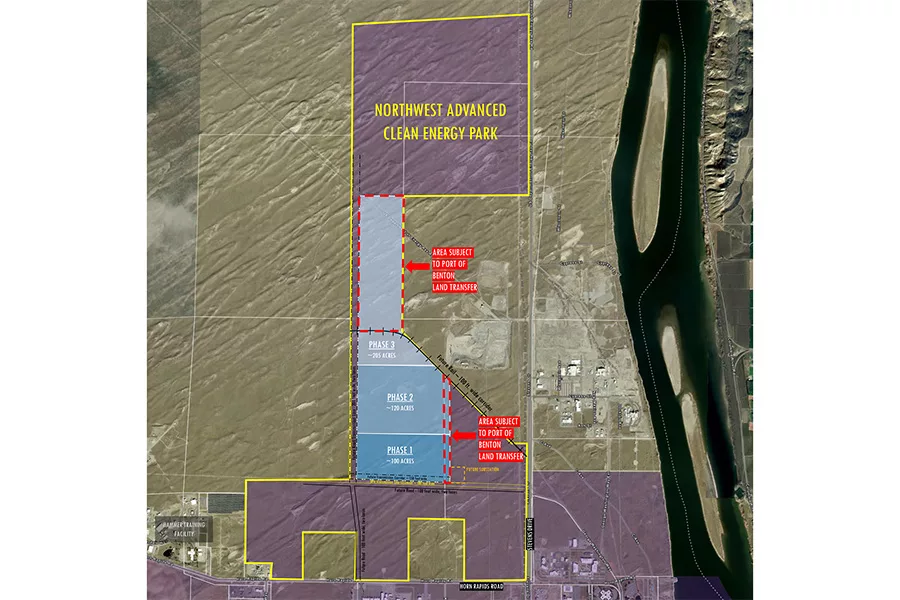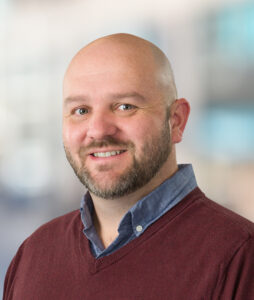
Home » Richland OKs land deal that could bring $3 billion investment
Nuclear city
Richland OKs land deal that could bring $3 billion investment

A land deal between the city of Richland and Washington Energy LLC for 425 acres could bring a $3 billion investment.
Courtesy city of RichlandJanuary 16, 2025
Even before Richland’s city council heard the presentation on an agreement to sell up to 425 acres of land to an energy company that could bring billions of dollars of investment and thousands of jobs, members heard from a packed council chamber that they needed to unanimously approve it.
Trade union representatives, education leaders, executives from Hanford contractors and community members took to the podium at the council’s Jan. 7 meeting. They all shared their enthusiasm for the deal with Washington Energy LLC.
“It’s going to take that investment that these companies are bringing to this area and keep it right here,” said Julian Jensen of Western States Carpenters Local 59. “It’s going to build our workforce in the area, it’s going to build our apprenticeships, it’s going to keep the money right here.”
Council members said they were impressed at the support for the project and the details of the deal. Washington Energy LLC would have up to five years to exercise its option to buy the land at Richland’s Northwest Advanced Clean Energy Park, previously known as Horn Rapids Industrial Park, ostensibly to build a 1 million-square-foot facility devoted to nuclear fuel cycle processing.
The council unanimously approved allowing city staff to finalize agreements with Washington Energy and manage potential future sales. If the company buys all the acreage set aside for them, the city will get about $26.8 million in exchange.
But it’s a deal that could take years to come to fruition, if it does at all.
“The lawyer in me is somewhat smirking over the fact that I don’t think the (Nuclear Regulatory Commission) process is going to be very enjoyable,” Mayor Pro Tem Sandra Kent said to Washington Energy’s representative at the meeting. “You’ve got a long way to go in order to get all the permits that you need. But hopefully, in the meantime, there will be some interim activities that can be made so we can put people to work doing valuable things and making that investment in our community.”
Nuclear supply chain campus
Deputy City Manager Joe Schiessl told the council that Washington Energy is interested in Richland due to its strong nuclear technology foundation, experienced workers, a nuclear-supportive community and a shared vision of making the region into a clean energy hub.
The company’s goal is to develop a nuclear supply chain campus with its own manufacturing facility as the anchor. That facility would come through a $3 billion investment while creating 1,000 direct jobs and another 3,000 that would support them, Schiessl said.
The land for the project is part of 1,341 acres that were formerly a part of the Hanford Nuclear Reservation. It was transferred from the U.S. Department of Energy to the Tri-City Development Council (TRIDEC) and eventually to Energy Northwest, the Port of Benton and the city of Richland for community benefit through development. City leaders have focused on recruiting industrial users in advanced clean energy and related technologies to fill the park’s individual parcels.
Details about Washington Energy are scarce. A corporation by that name was incorporated in November 2024 in Delaware. Drew DeWalt, the company executive who attended the council meeting, did not speak.
Washington Energy may extend the option agreement annually for up to five years, paying $1 million per extension to the city. There would be three phases of development, with the final one creating an opportunity for other enterprises to partner with Washington Energy’s facility.
Obstacles to overcome
There are a number of hurdles to overcome. In the next 30 days city staff and the company must work out the details of how the future purchase-and-sale agreement for the land will be structured. The city also must extend its targeted urban area, which can provide property tax exemptions, to cover the acreage set aside for Washington Energy.
Perhaps the biggest obstacle is on the company’s side of the court: securing approval from the NRC. Obtaining facility design certifications can take three years or more, according to timelines from the commission. A license to operate a fuel cycle facility also takes about three years to acquire. A special construction permit also may be needed. Those processes involve formal applications as well as public involvement.
Key to the future
Those who addressed the council said this project is key to the region’s future, allowing it to diversify its economy, continue its nuclear legacy and help meet the growing demands for energy.
“We want to double down on the fact that Richland has always been a nuclear city,” said Karl Dye, president and CEO of TRIDEC. “We want to show the rest of the world, and especially as the U.S. works to supply our nuclear supply chain, that we are the right place. We are the place to build this project.”
“We all know that nuclear energy will need to be a part, a very large part, of our decarbonized future,” said Sandra Haynes, chancellor of Washington State University Tri-Cities.
Latest News Real Estate & Construction Local News Energy Manufacturing
KEYWORDS January 2025
Related Articles
Related Products





